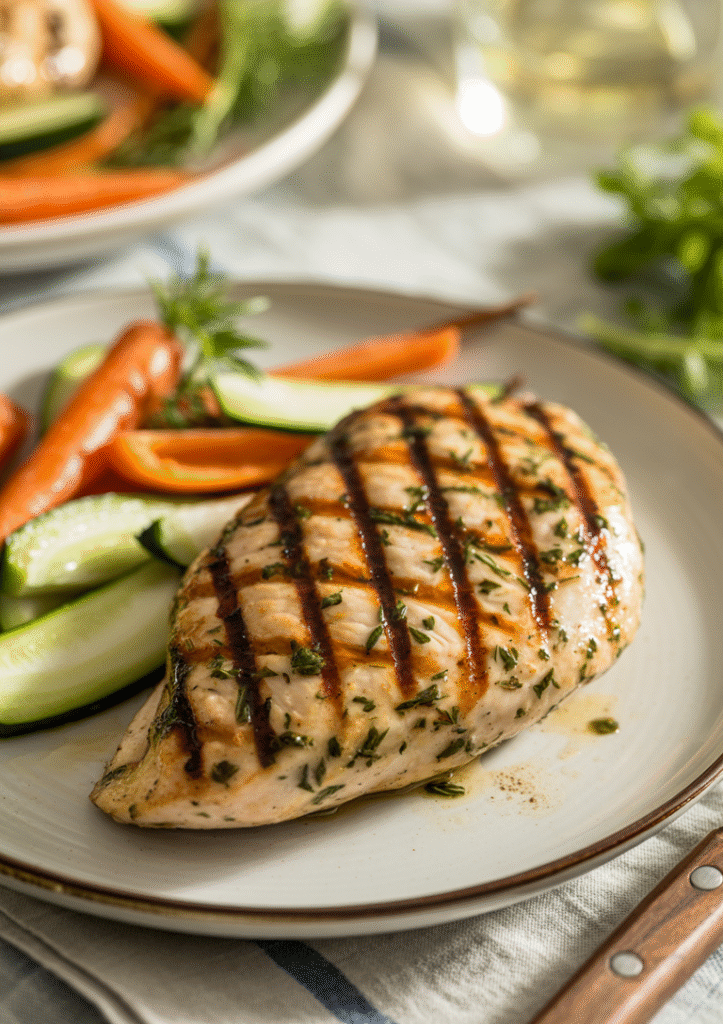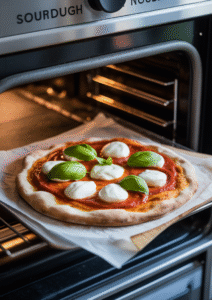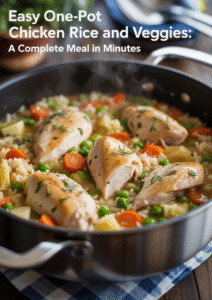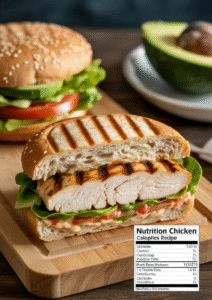Are you counting calories but still want to enjoy a delicious and satisfying meal? Grilled chicken is your perfect solution. With its lean protein content and relatively low grilled chicken calories, it makes an excellent choice for those seeking light meals without sacrificing flavor. This herb-marinated grilled chicken recipe delivers a juicy, flavorful result while keeping the calorie count in check, making it ideal for a light dinner or meal prep option. Learn how to prepare this simple yet delicious dish that combines health benefits with amazing taste.
Herb-Marinated Grilled Chicken: A Perfect Light Meal
This herb-marinated grilled chicken recipe delivers maximum flavor while keeping the calories in check. At just 215 calories per serving, it’s the perfect option for anyone watching their caloric intake without wanting to sacrifice taste or satisfaction.
Recipe Overview
- Prep Time: 15 minutes (+ 2 hours marinating time)
- Cook Time: 12-15 minutes
- Servings: 4
- Difficulty: Easy
- Calories per Serving: 215
Ingredients
- 4 boneless, skinless chicken breasts (about 5-6 oz each)
- 3 tablespoons olive oil (divided – 2 tbsp for marinade, 1 tbsp for grilling)
- 2 cloves garlic, minced
- 1 tablespoon fresh lemon juice
- 1 teaspoon lemon zest
- 1 tablespoon fresh rosemary, chopped
- 1 tablespoon fresh thyme leaves
- 1 teaspoon dried oregano
- ½ teaspoon sea salt
- ¼ teaspoon freshly ground black pepper
- Lemon wedges for serving (optional)
Equipment Needed
- Grill (outdoor grill or indoor grill pan)
- Meat thermometer
- Small mixing bowl
- Whisk
- Shallow dish for marinating
- Plastic wrap or reusable cover
- Tongs
- Cutting board
Instructions
Step 1
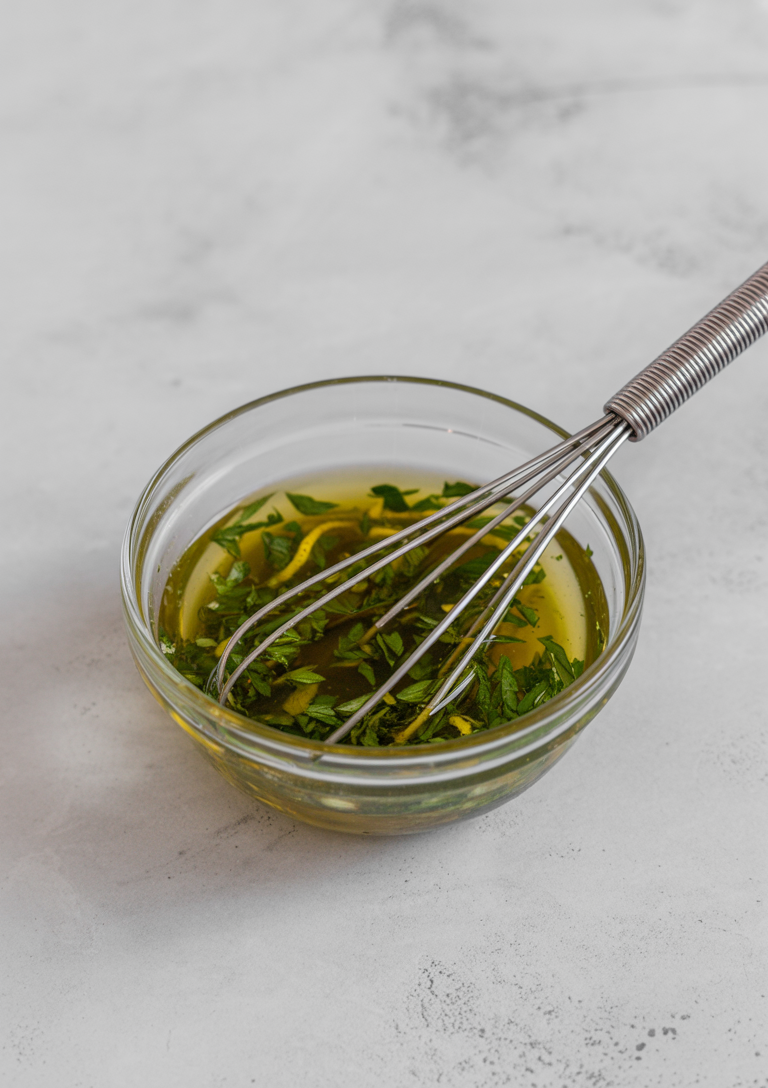
In a small bowl, whisk together 2 tablespoons olive oil, minced garlic, lemon juice, lemon zest, rosemary, thyme, oregano, salt, and pepper until well combined. This aromatic mixture will serve as your marinade, infusing the chicken with Mediterranean flavors while keeping the calorie count low. The olive oil provides healthy fats and helps the herbs and spices adhere to the meat, while the lemon juice adds brightness and helps tenderize the protein.
Step 2
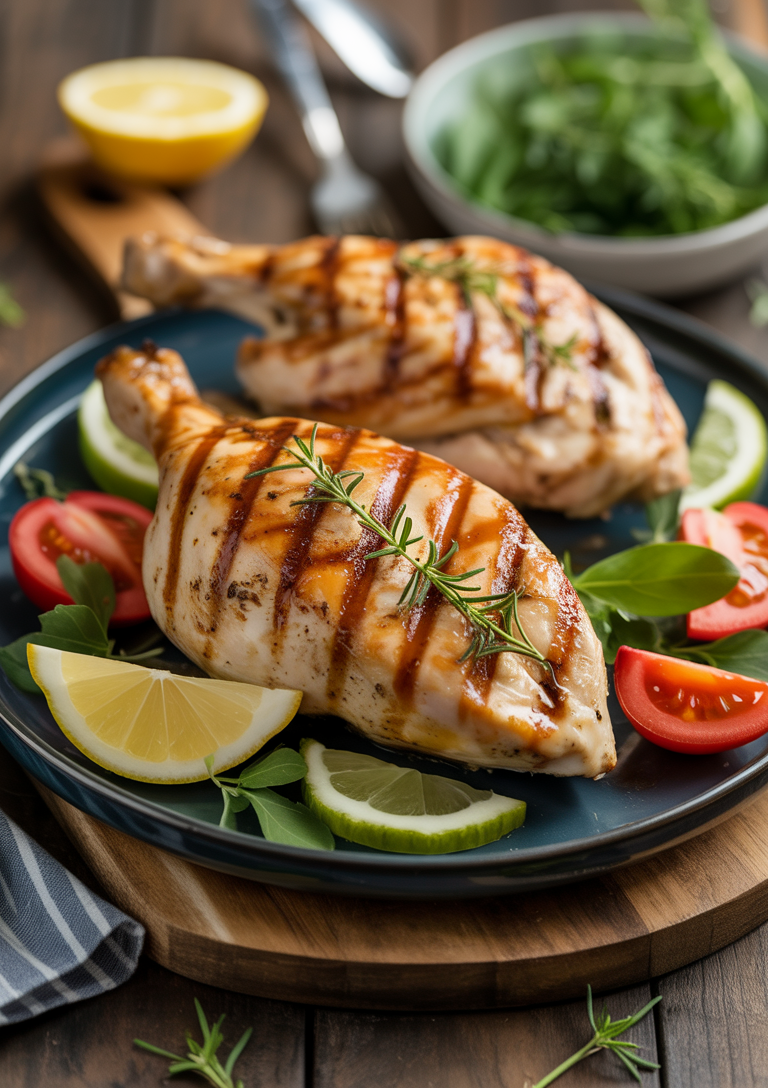
Place the chicken breasts in a shallow dish and pour the marinade over them. Use your hands or tongs to ensure each chicken breast is evenly coated with the marinade on all surfaces. The marinade should completely cover the meat for optimal flavor penetration.
Cover the dish with plastic wrap or transfer the chicken and marinade to a sealed plastic bag. Refrigerate for at least 2 hours, though overnight marination is ideal for maximum flavor infusion. The longer marination time allows the herbs, spices, and acids in the marinade to break down the proteins slightly, resulting in more tender and flavorful grilled chicken.
Pro tip: Turn the chicken halfway through the marinating process to ensure even distribution of flavors.
Step 3

Preheat the Grill and Prepare the Chicken
When ready to cook, preheat your grill to medium-high heat (approximately 375-400°F or 190-200°C). This temperature range ensures the chicken cooks evenly while developing those desirable grill marks without burning the exterior.
While the grill is heating, remove the marinated chicken from the refrigerator and let it sit at room temperature for about 15 minutes. This step is crucial for even cooking – cold chicken placed directly on a hot grill will cook unevenly, with the outside potentially overcooking before the center reaches the safe internal temperature.
Pro tip: Use this time to clean your grill grates with a grill brush and lightly oil them to prevent sticking. This ensures your perfectly seasoned chicken will release cleanly from the grates, maintaining its appetizing appearance.
Step 4
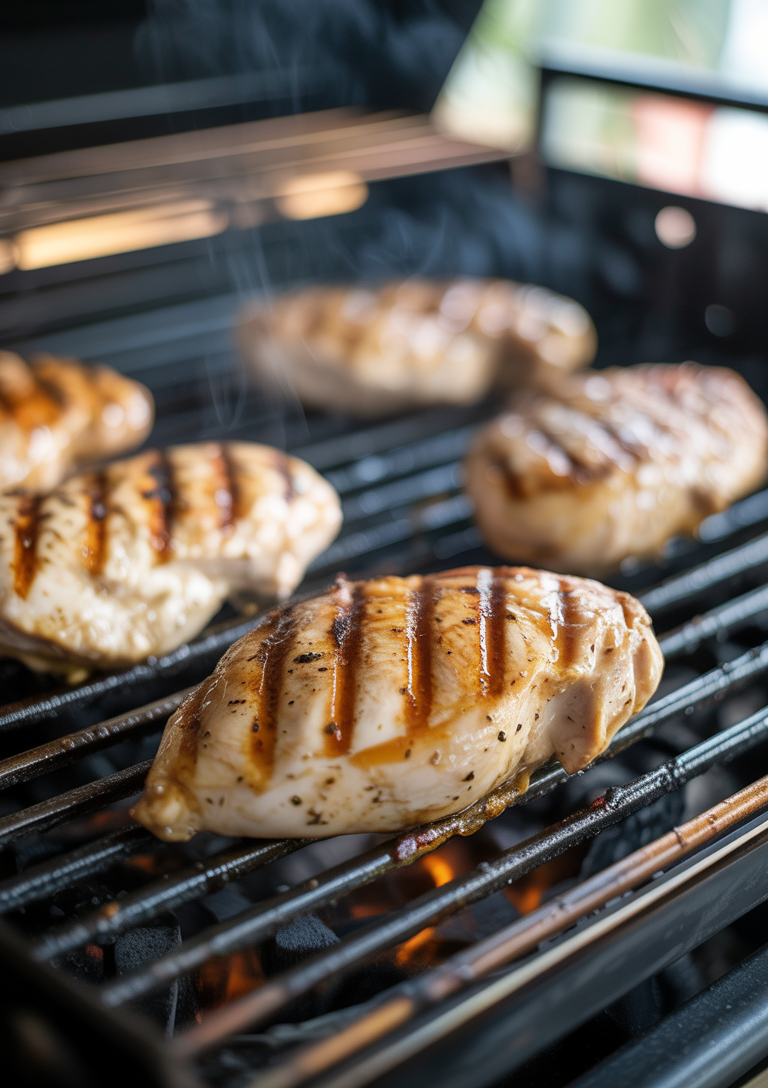
Lightly brush the grill grates with the remaining 1 tablespoon of olive oil to prevent the chicken from sticking during cooking. Carefully place the marinated chicken breasts on the preheated grill, ensuring they’re positioned over direct heat.
Cook the chicken for 5-7 minutes on each side, flipping only once to maintain those beautiful grill marks. The exact cooking time will depend on the thickness of your chicken breasts.
Important: Use a meat thermometer to check for doneness rather than relying solely on cooking time. Insert the thermometer into the thickest part of the breast and ensure it reads 165°F (74°C) before removing from the grill. This temperature ensures the chicken is safely cooked while remaining juicy and tender.
Step 5
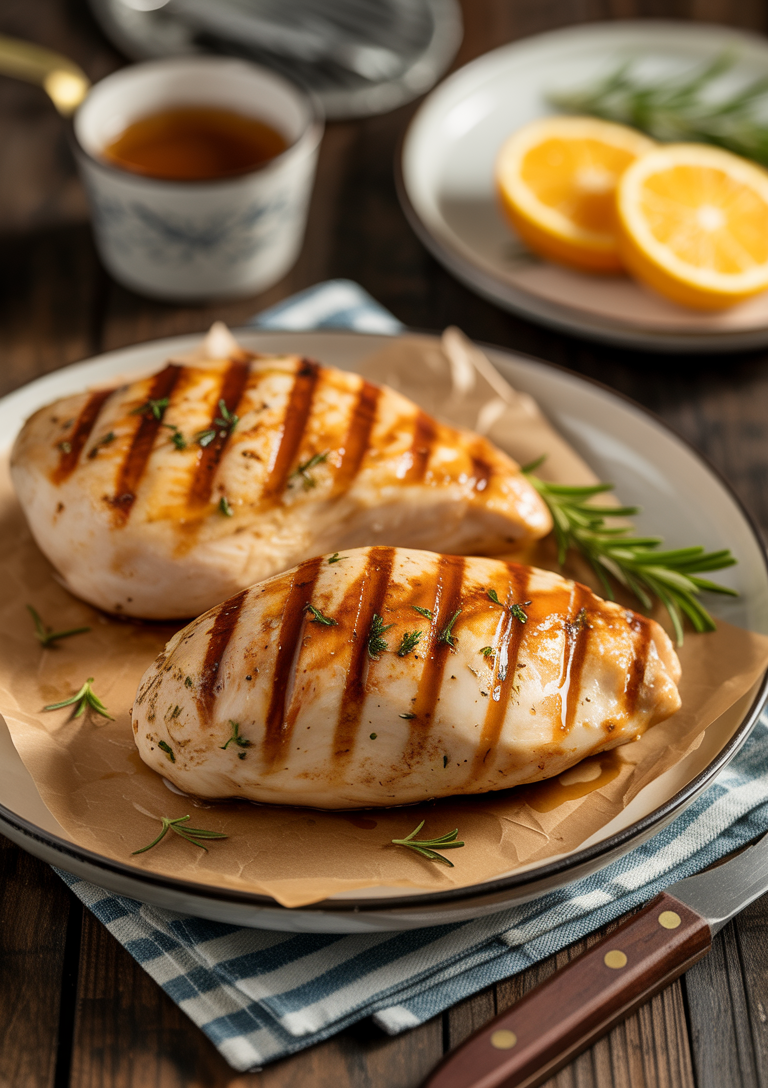
Once cooked, transfer the grilled chicken to a clean cutting board and let it rest for 5 minutes before slicing. This resting period is crucial as it allows the juices to redistribute throughout the meat, ensuring a moist and tender result.
While the chicken rests, prepare your serving area. When ready to slice, cut the chicken breast against the grain into even portions. This technique helps maintain the meat’s tenderness and makes it easier to chew.
Serving suggestions for a complete light dinner:
- Fresh lemon wedges for a bright citrus finish
- Steamed broccoli or asparagus (20-30 calories per cup)
- Mixed green salad with balsamic vinaigrette
- Quinoa or cauliflower rice for added fiber
- Grilled zucchini or bell peppers
These low-calorie accompaniments complement the lean protein while keeping your meal nutritious and satisfying without adding excessive calories to your dinner.
Why Choose Grilled Chicken for Light Dinners
Grilled chicken has become a staple in many health-conscious diets, and for good reason. The grilled chicken calories are notably lower than many other protein options, especially when compared to fried alternatives or red meats. Let’s delve deeper into why grilled chicken makes an excellent choice for light meals.
Nutritional Profile of Grilled Chicken
Grilled chicken, particularly the breast meat, is one of the leanest protein sources available. A typical 5-6 oz chicken breast, when grilled without skin, contains approximately:
- Calories: 165-215 (depending on exact size and preparation)
- Protein: 31-36g
- Fat: 3.6-4.5g (mostly unsaturated)
- Carbohydrates: 0g
- Sodium: 74mg (without added salt)
When you compare these numbers to other protein sources, the caloric efficiency becomes clear. You get a significant amount of protein for relatively few calories, making it perfect for those on a calorie-controlled diet.
Benefits of Grilling as a Cooking Method
Grilling is one of the healthiest cooking methods for several reasons:
- Reduced fat content: When you grill chicken, excess fat drips away from the meat
- No added oils or fats necessary: Unlike pan-frying which often requires additional oils
- Flavor enhancement: The natural smoky flavor from grilling reduces the need for high-calorie sauces
- Nutrient retention: Grilling preserves more nutrients than some other high-heat cooking methods
For those monitoring their calorie intake, the grilling method itself contributes to keeping grilled chicken calories in check while maximizing flavor.
Marinade Magic: Flavor Without Extra Calories
Our herb marinade in this recipe adds tremendous flavor with minimal additional calories. The olive oil component, while containing calories, is mostly heart-healthy monounsaturated fat. Fresh herbs and lemon juice provide flavor without significantly increasing the calorie count.
This approach demonstrates how to create satisfying light dinners that don’t feel like deprivation—an important factor in sustainable healthy eating.
